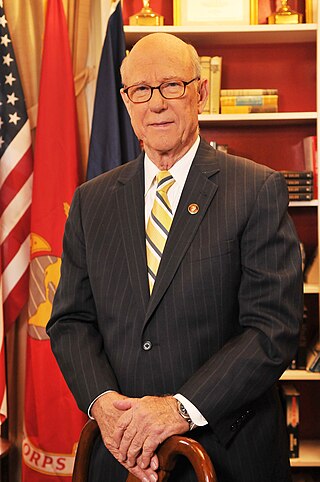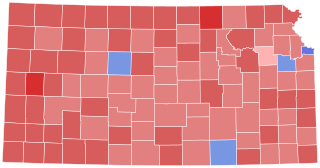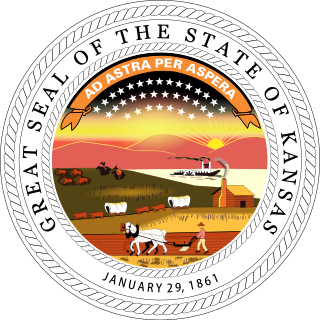
Charles Patrick Roberts is a retired American politician and journalist who served as a United States senator from Kansas from 1997 to 2021. A member of the Republican Party, Roberts served 8 terms in the U.S. House of Representatives, from 1981 to 1997, before his election to the Senate.

The 1996 United States Senate elections were held on November 5, 1996, with the 33 seats of Class 2 contested in regular elections. Special elections were also held to fill vacancies. They coincided with the presidential election of the same year, in which Democrat Bill Clinton was re-elected president.

The Kansas Republican Party is the state affiliate political party in Kansas of the United States Republican Party. The Kansas Republican Party was organized in May 1859.

The 2008 United States Senate election in Kansas was held on November 4, 2008. Incumbent Republican U.S. Senator Pat Roberts won re-election to a third term.

The 2002 United States Senate election in Kansas was held on November 4, 2002. Incumbent Republican U.S. Senator Pat Roberts won re-election to a second term overwhelmingly. No Democrats filed to run, and Roberts was only opposed by a Libertarian candidate and a Reform Party candidate. This was the only United States Senate election in Kansas in which Pat Roberts won every county in the state.

The 1996 United States Senate special election in Kansas was held November 5, 1996, concurrently with the presidential election and the regularly scheduled election for the state's Class 2 seat. Incumbent Republican U.S. Senator and Senate Majority Leader Bob Dole, the Republican nominee for president, had resigned on June 11, 1996, in order to focus on his presidential campaign. Lieutenant Governor Sheila Frahm was appointed to the seat upon Dole's resignation, but she was defeated in the primary by Representative Sam Brownback, who went on to win the general election over Democrat Jill Docking.

The 2016 United States Senate elections were held on November 8, 2016. The presidential election, House elections, 14 gubernatorial elections, and many state and local elections were held concurrently.

United States gubernatorial elections were held on November 4, 2014, in 36 states and three territories, concurrent with other elections during the 2014 United States elections.

The 2014 United States Senate election in Kansas was held on November 4, 2014, to elect a member of the United States Senate to represent the State of Kansas, concurrently with other elections to the United States Senate in other states and elections to the United States House of Representatives and various state and local elections.

A general election was held in the U.S. state of South Carolina on November 4, 2014. All of South Carolina's executive officers were up for election as well as both United States Senate seats, and all of South Carolina's seven seats in the United States House of Representatives.

The 2016 United States Senate election in Iowa was held November 8, 2016, to elect a member of the United States Senate to represent the State of Iowa, concurrently with the 2016 U.S. presidential election, as well as other elections to the United States Senate in other states and elections to the United States House of Representatives and various state and local elections.

A general election was held in the U.S. state of Kansas on November 4, 2014. Primary elections were held on August 5.

The 2020 United States Senate elections were held on November 3, 2020, with the 33 class 2 seats of the Senate contested in regular elections. Of these, 21 were held by Republicans, and 12 by Democrats. The winners were elected to 6-year terms from January 3, 2021, to January 3, 2027. Two special elections for seats held by Republicans were also held in conjunction with the general elections: one in Arizona, to fill the vacancy created by John McCain's death in 2018; and one in Georgia, following Johnny Isakson's resignation in 2019. These elections ran concurrently with the 2020 United States presidential election in which incumbent president Donald Trump lost to Democratic nominee Joe Biden.

The 2020 United States Senate election in Kansas was held on November 3, 2020, to elect a member of the United States Senate to represent the State of Kansas, concurrently with the 2020 U.S. presidential election, as well as other elections to the United States Senate, elections to the United States House of Representatives and various state and local elections.

The Ohio general elections, 2018, were held on November 6, 2018, throughout Ohio.

A general election was held in the U.S. state of Arizona on November 6, 2018. All of Arizona's executive offices were up for election as well as a United States Senate seat and all of Arizona's nine seats in the United States House of Representatives. The Republican Party won the majority of statewide offices, albeit by much narrower margins than in previous elections, while the Democratic Party picked up three statewide offices.

The 2022 United States Senate elections were held on November 8, 2022, concurrently with other midterm elections at the federal, state and local levels. Regularly scheduled elections were held for 34 of the 100 seats in the U.S. Senate, the winners of which will serve 6-year terms beginning with the 118th United States Congress. 2 special elections were held to complete unexpired terms. While pundits considered the Republican Party a slight favorite to gain control of the Senate, the Democrats outperformed expectations and expanded the majority they had held since 2021, gaining a seat for a functioning 51–49 majority.

The 2018 United States House of Representatives elections in Oklahoma were held on November 6, 2018, to elect the five U.S. representatives from the state of Oklahoma, one from each of the state's five congressional districts. The elections coincided with other elections to the House of Representatives, elections to the United States Senate and various state and local elections. Primary elections were held on June 26 and runoff elections were held two months later on August 28. The state's U.S. House delegation Republican majority changed from 5–0 to 4–1. As of 2023 this is the only time since 2010 that Democrats won any house race in Oklahoma.

A general election was held in the U.S. state of Vermont on November 5, 2002. All of Vermont's executive officers were up for election as well as Vermont's at-large seat in the United States House of Representatives.

The North Carolina Council of State elections of 2020 were held on November 3, 2020, to select the ten officers of the North Carolina Council of State. These elections coincided with the presidential election, elections to the House of Representatives, elections to the Senate and elections to the North Carolina General Assembly and top state courts. Primary elections were held on March 3, 2020, for offices for which more than one candidate filed per party.























